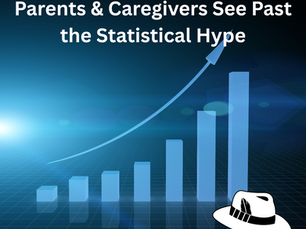top of page


The Unseen Playmate: Navigating The Increasing Popularity Of AI Toys
AI toys are set to be a hit this holiday season, offering interactive learning and companionship. Yet beneath their charm lie concerns about privacy, data collection, and emotional dependency. Toys like Barbie with ChatGPT and Curio can record voices, store data, and mimic friendship. Experts warn this may disrupt real human connection. Parents should research privacy policies, limit connectivity, and balance AI play with real interaction.

The White Hatter
Oct 15, 20255 min read


Talking With Kids About Online Content: Finding the Middle Ground
Raising kids today means guiding them through a flood of online voices, from podcasts to TikTok to group chats. Some content can feel extreme, and the instinct is to shut it down. But when youth only hear one side, they lose the chance to think critically. By asking questions, listening, and exploring sources together, parents can help kids build balance, resilience, and thoughtful perspectives in a noisy digital world.

The White Hatter
Sep 26, 20253 min read


Banning Tylenol and Technology: A Lesson In The Oversimplification Of Research
When fear meets complexity, bans often feel like the easiest fix. But history shows that blunt prohibitions rarely solve nuanced problems. Just as the Tylenol - autism debate oversimplifies medical risks, calls to ban phones and social media from kids risk ignoring both evidence and opportunity. Parents and schools need balance, not bans, to truly protect and prepare youth.

The White Hatter
Sep 25, 20254 min read


iOS 26 Roll-Out For iPhone & iPad: What Parents & Caregivers Need to Know About Apple’s New Safety Features
iOS 26 Roll-Out For iPhone & iPad: What Parents & Caregivers Need to Know About Apple’s New Safety Features
Apple is putting safety technology front and center with its latest software release, iOS 26 (1). First announced in June and now available worldwide, the update introduces a suite of parental controls designed to make iPhones, iPads, Macs safer.
These tools are not a substitute for conversations or active parenting, but they can support the boundaries you have alread

The White Hatter
Sep 23, 20254 min read


Sorting Fact from Fear - Helping Parents & Caregivers See Past the Statistical Hype
A viral bar graph claims screens, sleep, and work swallow nearly all of life, leaving almost no free time. Eye-catching? Yes. Accurate? Not at all. With no data, no citations, and exaggerated numbers, it’s designed to alarm, not inform. Using real Canadian research, we show why parents shouldn’t panic over hype-driven graphics and instead focus on balance, purpose, and evidence.

The White Hatter
Sep 22, 20254 min read


Why Researchers Who Disagree with Dr. Haidt Must Reconsider How They Communicate Their Message!
Dr. Jonathan Haidt has mastered something many academics overlook: how to connect with parents, caregivers, and policymakers in today’s networked world. His book The Anxious Generation dominates the conversation, while equally evidence-based works remain largely unknown. If researchers want their voices heard, they must rethink how they communicate, or risk being left out of the public dialogue.

The White Hatter
Sep 21, 20254 min read


Contrary To What Some In Our Industry Say, Parents and Caregivers CAN Compete With Big Tech!
Parents are not powerless against Big Tech. Despite billion-dollar budgets and endless algorithms, research shows that kids don’t just absorb content, they interpret it through the conversations, examples, and guidance they get at home. Your presence and influence shape how they see the online world. Big Tech may capture their eyes, but you shape their understanding.

The White Hatter
Sep 21, 20255 min read


“6,7” and the Language of Gen Alpha
What does ‘6,7’ mean?” That’s the question teachers and parents across the country are asking as Gen Alpha turns a random lyric into a cultural code. It’s slang, identity, and sometimes defiance, all rolled into two numbers. To understand it is to glimpse how music and internet culture shape youth language today

The White Hatter
Sep 19, 20252 min read


When Teens See Adults as the Real Bullies - An Inconvenient Truth!
A teen recently told us, ‘Adults are the biggest bullies, especially in politics, where aggression pays.’ His peers applauded because they knew it was true. Kids are watching adults preach kindness while modeling hypocrisy. If we want youth to believe bullying is unacceptable, it starts with us proving it. The inconvenient truth? Too many adults are failing them.

The White Hatter
Sep 18, 20253 min read


Seniors Beware: Medical Fraud and the Rise of Deepfake Scams
Scammers are using deepfake videos to target Canadian seniors with fake “CBC reports” and phony doctor endorsements for miracle cures like “Blood Balance Plus.” One slick ad claimed type 2 diabetes could be reversed in 14 days, with “only 17 left.” It looked real. It wasn’t. Learn the red flags, verify with trusted sources, and talk to your doctor before a convincing fake costs you money and health. Share this with parents and grandparents.

The White Hatter
Sep 16, 20254 min read


Why Technology Becomes the Target in the Aftermath of Tragedy
When tragedy strikes, grief often fuels the search for someone, or something, to blame. Today, technology, social media, and video games are cast as easy targets. While these tools can amplify harmful voices, history shows violence long predates the internet. The real challenge isn’t banning tech but preparing youth with the digital literacy, resilience, and critical thinking skills to navigate it.

The White Hatter
Sep 16, 20255 min read


Online Conflict Entrepreneurship - A Recognized and Concerning Business Model.
Conflict has become a commodity. Today’s “conflict entrepreneurs” know outrage sells, and social media algorithms pay them handsomely for it. By manufacturing division, they profit from clicks, merch, and loyalty while shaping the career dreams of youth who see fighting online as a path to fame. For families, the question isn’t if this model exists, it’s how it’s influencing the next generation.

The White Hatter
Sep 15, 20254 min read


Algorithms, Outrage, Radicalization, and Raising Resilient Kids in an Increasingly Online Polarized World
Why do the loudest and most extreme voices dominate our kids’ social media feeds? It isn’t by accident, it’s by design. Algorithms reward outrage because anger drives clicks, shares, and profit. The danger is that teens may mistake these amplified extremes for everyday reality. Parents must help them see past the noise, build resilience, and find strength in the middle ground.

The White Hatter
Sep 14, 20255 min read


Hopelessness and Frustration: Catalysts in the Metastasis of Radicalization
Why are some young people drawn toward extremism? At The White Hatter, after decades of listening to teens, one theme keeps surfacing: hopelessness. When doors to housing, education, jobs, and even healthcare feel locked, frustration can deepen into despair. Left unchecked, that despair can make youth more vulnerable to radical voices. Hope, and being heard , are critical safeguards

The White Hatter
Sep 13, 20254 min read


Talking to Our Kids About Violence, Radicalization, and the Role of Social Media
When violent tragedies unfold, social media doesn’t just report, it amplifies. Graphic videos, conspiracy theories, and polarizing narratives spread within hours, creating fertile ground for those who want to recruit and radicalize youth. No family is immune. Parents need to step in with open, honest conversations that help kids process emotions, spot manipulation, and know they’re not alone.

The White Hatter
Sep 12, 20254 min read


Anxious Parents Are Creating Anxious Kids!
Anxiety in youth isn’t born in a vacuum, it often reflects what they see in us. Kids don’t just listen, they watch how we react, solve problems, and cope. When parents catastrophize or ban technology without explanation, it fuels worry. Calm modeling, open conversations, and digital literacy help shift anxiety from something that controls kids to something they can manage with confidence.

The White Hatter
Sep 8, 20255 min read


Social Media, Kids, Parents, and Accountability vs. Responsibility
Think your child is too young for social media? Chances are, they’re already on it. Studies from Canada, the U.S., Australia, and Ireland all say the same thing: huge numbers of kids under 13 have accounts, often set up with a parent’s help. That means the conversation can’t stop at blaming tech companies, it has to include the choices we make at home as a parent or caregiver

The White Hatter
Sep 7, 20254 min read


What Parents Should Know About This Stealerium Malware Story
A new type of malware named “Stealerium” is being used by cybercriminals in highly invasive attacks. (1) It doesn’t just grab passwords or financial info, it actively watches for pornography searches or browsing. When it detects such content, it secretly takes screenshots of the browser and snaps a photo of the user via their webcam. All this data is then sent to criminals who can use it to blackmail victims.

The White Hatter
Sep 6, 20252 min read


Do Tech Bosses Really Ban Their Kids From Screens?
For years, headlines have claimed that Silicon Valley elites keep their kids away from the very technology they create, pointing to one small “tech-free” school as proof. It’s a compelling story, but it isn’t true. Most tech leaders don’t ban screens , they set boundaries, guide use, and model balance, just like many families already do.

The White Hatter
Sep 4, 20252 min read


Snapchat’s New “Home Safe” Feature: What Parents Need to Know
Worried about your teen getting home safely? Snapchat’s new Home Safe feature automatically alerts a trusted friend when they arrive at their set home location. It’s a one-time notification designed to balance safety with independence, no constant tracking, just peace of mind. Here’s how it works, plus tips for parents on using it wisely.

The White Hatter
Sep 2, 20253 min read
bottom of page
